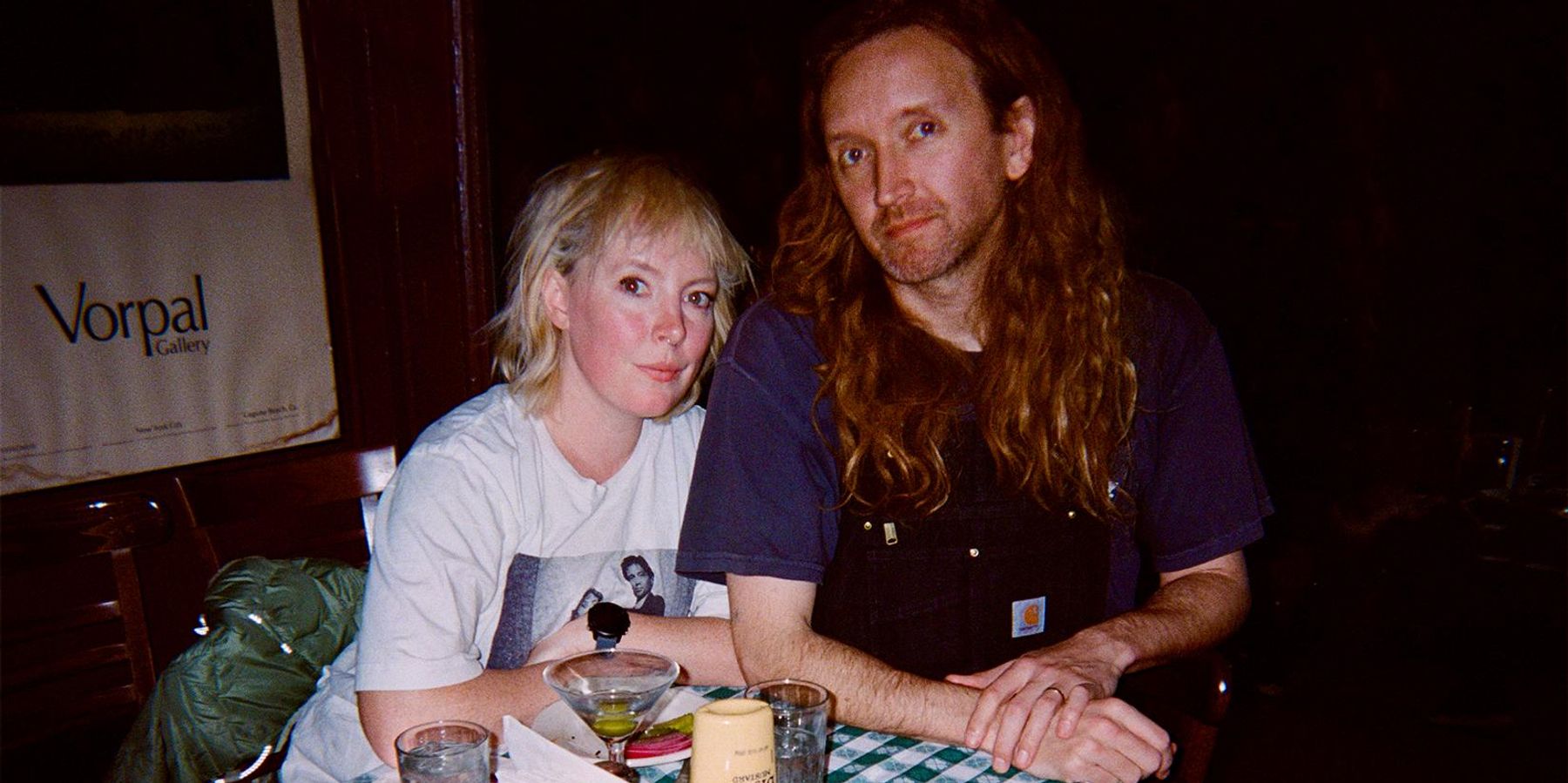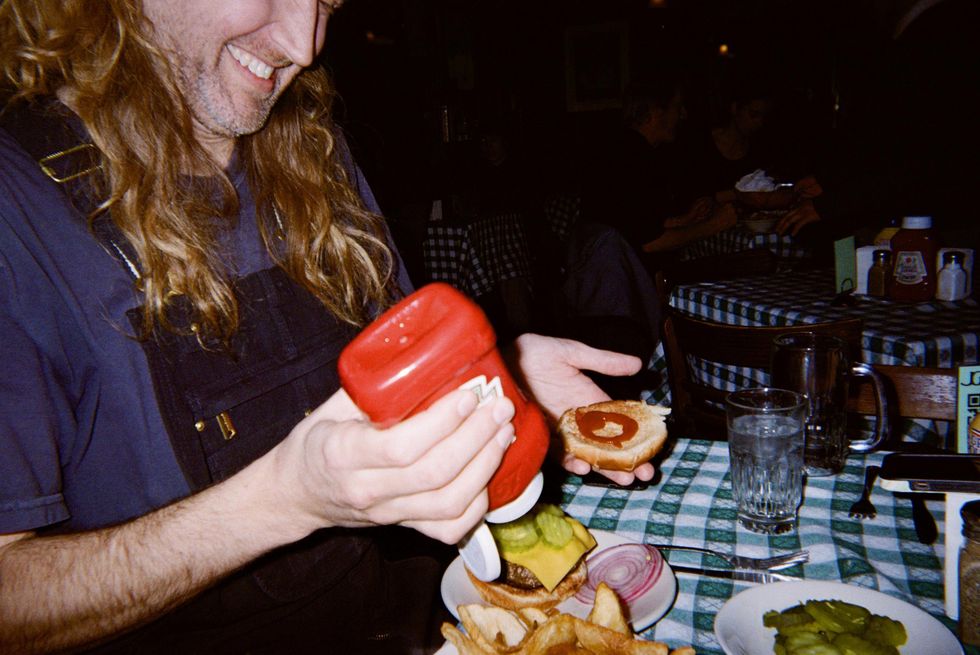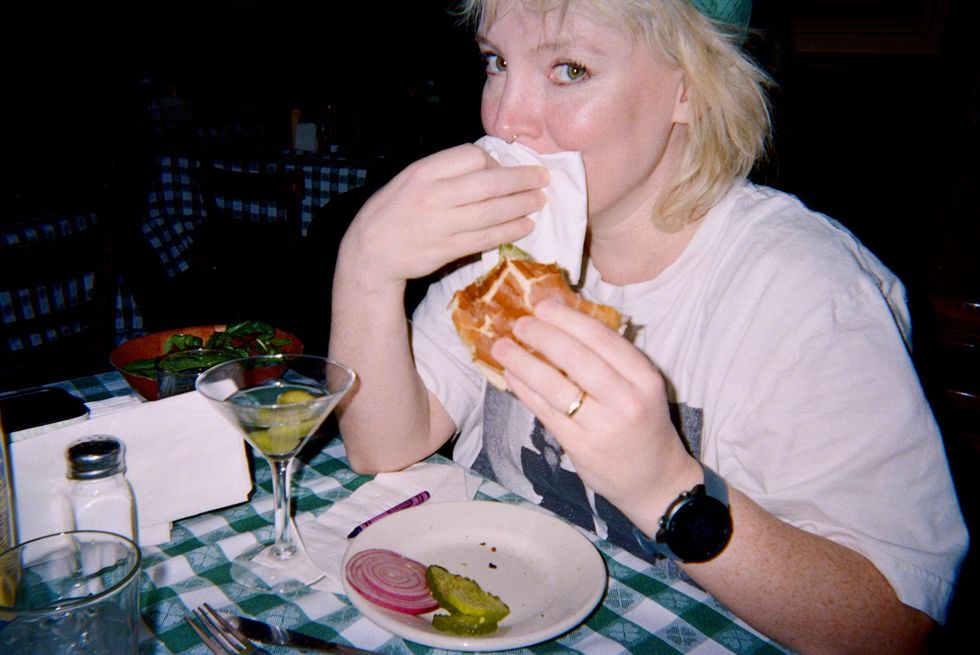
Sylvan Esso, the North Carolina-based electro-pop duo, kicked down industry doors in 2014 with their eponymous debut studio album, Sylvan Esso. It's one of those special captures-a-moment-in-time records, where escaping into the rousing, body-moving tracklist, a folksy mixture of skillful (yet unpretentious) electronic production, felt like discovering an untapped reserve of talent. The album has since accumulated over 250 million streams on Spotify and propelled the band into mainstream success.
Ten years into their career as Sylvan Esso, singer Amelia Meath and engineer/producer Nick Sanborn have gotten married, toured the country and sold out shows around the globe. Yet somehow they feel like they're just getting started.
I meet Meath and Sanborn — "Sandy," as she calls him — for lunch at preppy Upper East Side institution J.G. Melon. Squeezing puffer coats and backpacks through the tightly arranged floor plan, we wedge ourselves into a corner table with views of East 74th Street. The band is in town for a whirlwind visit of record signing, an Electric Lady Studios Spotify session, a CBS Saturday Morning live show and, most importantly, to see the physical release of their most recent record, No Rules Sandy. Even in the mustard-tinged lighting, the two glow with the frenetic flush of maneuvering a tightly scheduled press trip.

No Rules Sandy, Sylvan Esso's fourth studio album, which dropped this summer, was immortalized on January 20th in its physical form. Now, the band is gearing up for their summer tour (with major venues like Red Rocks and London's Electric Brixton already selling out) and has newfound confidence in the longevity and durability of the band.
"Can I have a dirty Beefeater martini?" Meath asks the aproned waiter. She turns back to us and says, "I know it’s only three, but we did TV already." They’ve just come uptown from a CBS live taping in Times Square. "Fucking genius," Sanborn says, smiling from across the table. They decide to split a cheeseburger with a "fuck yeah" and a satisfying menu pile. "Your hair is just crazy," Sanborn says jokingly to Meath, who tousles her wispy, blonde hair into a more chaotic position.
"There's something exciting about being a band, coming up on 10 years old, and feeling like there’s still so much for us to discover together," Sanborn tells me. There was a period of time before they started working on No Rules Sandy where he began to worry about playing decade-old songs and fighting to reclaim and relate to a distant version of himself. "This feels like a completely new way of working together, like cracking the knuckles of our band," he says.

In January 2022, Meath and Sanborn road-tripped from North Carolina to Los Angeles to attend the Grammys, as they'd been nominated for Best Dance/Electronic Music Album. With a spike in the Omicron COVID-19 variant, the Grammys were postponed, plans and hangouts dashed and the pair was left in their California rental with nothing to do. Three short weeks later, they had recorded the first version of No Rules Sandy. "It was a complete accident," Sanborn says.
"It began as just something to do that day," Sanborn says, sipping his Budweiser with raised eyebrows. "We were just playing around to make the other laugh or to be impressed."
"They're the most personal songs I've ever written," Meath says. "The first taste of every idea we had, we would just follow." Sanborn recalls that he’s never seen her write lyrics so fast, explaining that nearly all of the vocals on the album were from the first take, even sometimes the first time she ever sang them aloud. "Whatever microphone we had, wherever she was sitting in the house, we would record there. There's like leaf blowers and shit on the album," Sanborn says, laughing. "And birds!" Meath adds.
"I would write something and we would both be shocked by it," Meath says. "And then I'd be like, 'Well, we need to change this because it's too close." After multiple rewrites in hopes to distance herself from some of the more vulnerable lyrics, Meath says the songs would always end up worse. "I had to stop doing my mirror face at them," she says. "And even if it wasn’t as ‘cool,’ it’s what I was feeling."

"If we re-recorded anything, it just wouldn’t be the moment," Sanborn says. "It was true improvisation. And with improv, if you're doing it right, I think you’re being your most honest, raw self." Witnessing how the polishing and refining of their improvisational work was always to the detriment of the track, both Meath and Sanborn relaxed into the process and let go.
"The craziest thing... is that it worked," Sanborn says. The two sneak a glance across the table, a check-in or a shared moment of gratitude. The waiter comes over and Meath orders the cheeseburger. "Just from the tone of your voice, I’m detecting you want your own," Sanborn says with a chuckle.
The symbiosis of the pair can be felt in the adventurous nature of the record, intensely intimate and uniquely experimental, created by a partnership that thrives on trust and playfulness. The name of the album, partially an homage to Sanborn's nickname, is a representation of the band's new mentality that accepts and even welcomes the uncertainty of sonic risk-taking and improvisation. If their first record embodied joyfulness and exultation, this album invites unabashed exploration.

The epitome of Sylvan Esso's new ethos can be found in the track "Your Reality," an enigmatic synth-pop song with a swelling string quartet that holds the prophetic and titular hook, "Surreal but free?/ It's your reality (no rules lately, no rules Sandy)."
When Sanborn first produced the track, the two discovered that each had heard the downbeat differently. Meath had already written lyrics exploring the individual experience of one’s perceived reality and so, in an audacious gamble, decided to protect the disputed downbeat, constructing the baseline and vocal track in a way that validated both interpretations. The song quickly became the symbolic apex of the album — evidence of the duo's playful philosophy and keen experimentation. "Ninety-nine percent of people who listen to the track won't ever think about this. But it made the song both really simple and massively complex. And I think that's the hallmark of our band at this point," Sanborn says.
"There's a way to hear our band and kind of dismiss it. For better or worse, we write the type of songs that allow you to enjoy them on a surface level if you want. But if you want to dig into it, every step you go, there’s something for you to find," Sanborn says of the album. "I'm too Midwestern to be this cocky, but it’s something I don't think any other band could have written."

It’s a stark contrast to their last album Free Love, an earnest and tidy project that relied dutifully on the structured tradition of indie-pop. "In a lot of ways, it feels like this record is deeply a return to our first record, in that our first project was really asking, Well, what sounds good? What does this mean to me?" Sanborn says.
"I really don't feel like we're confined anymore," Sanborn adds. "It feels like we can keep changing because no matter what we do, if the two of us make it, it's gonna sound like a Sylvan Esso record. And knowing that makes all of the other questions go away."
The album still remains acutely close to the two, as it’s yet to be performed in front of their fans. "Songs creep up on me. And I’m still so deeply in the record because we haven't gotten to tour it yet," Meath says. "There's so much more to be discovered."

Photos by Alessandra Schade
From Your Site Articles
Related Articles Around the Web